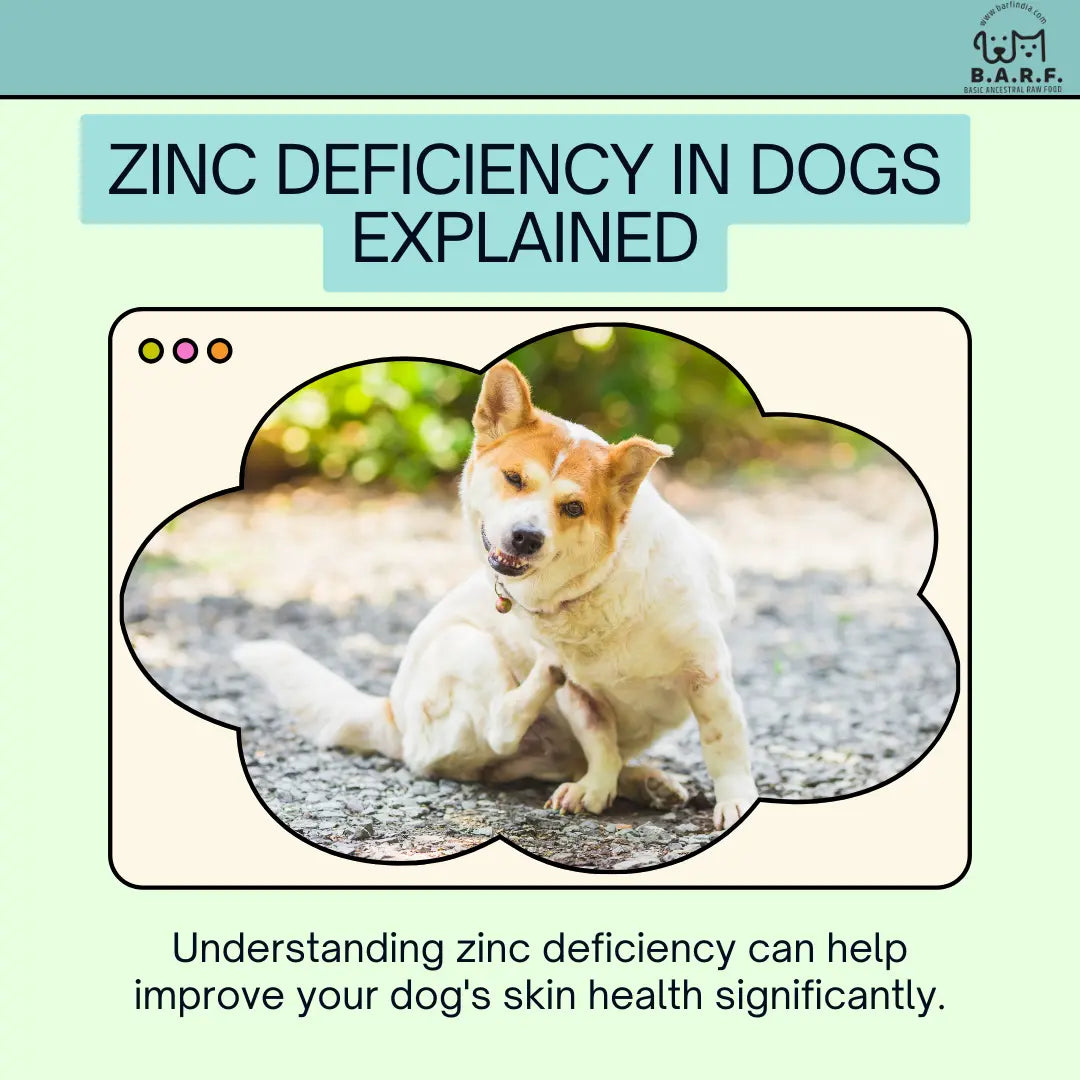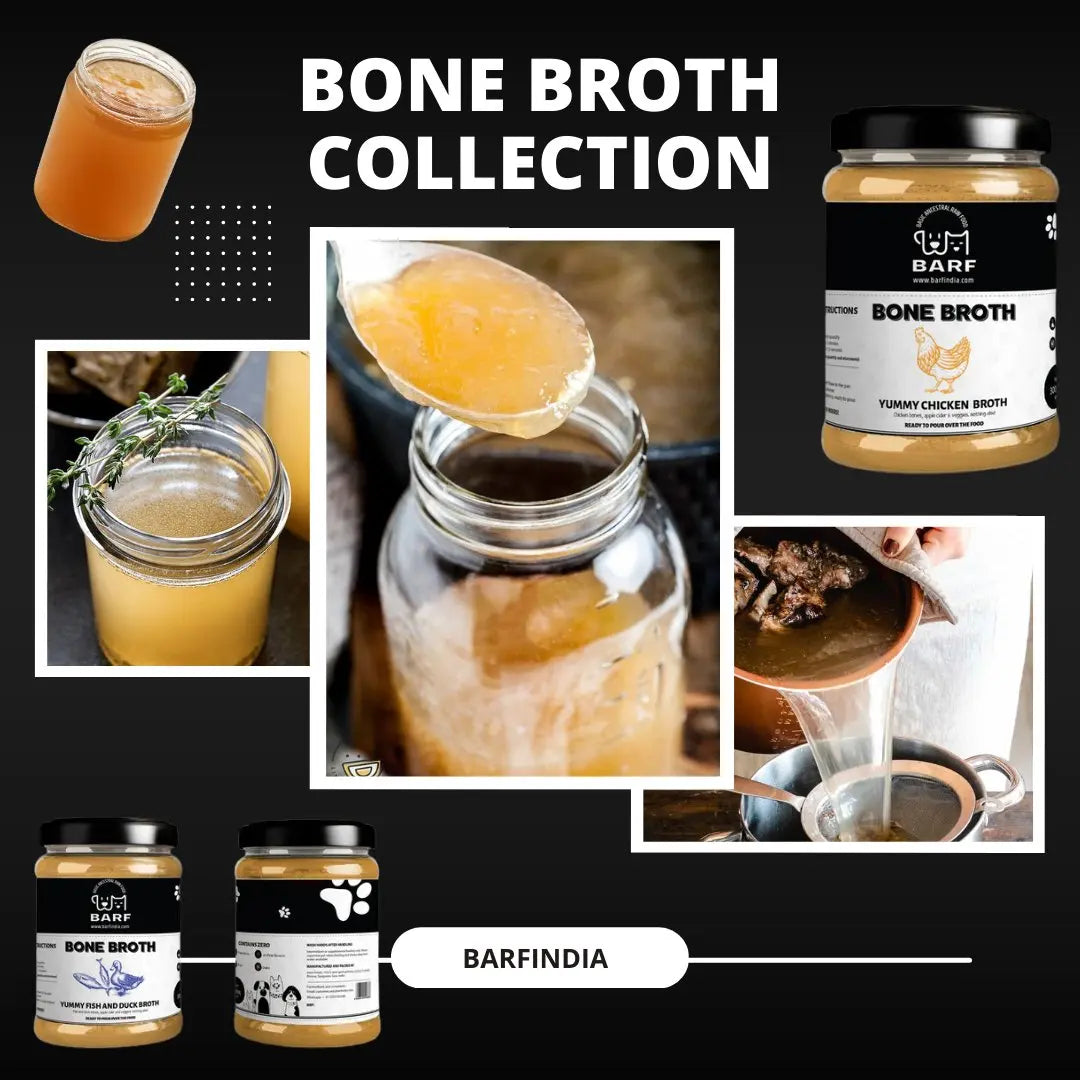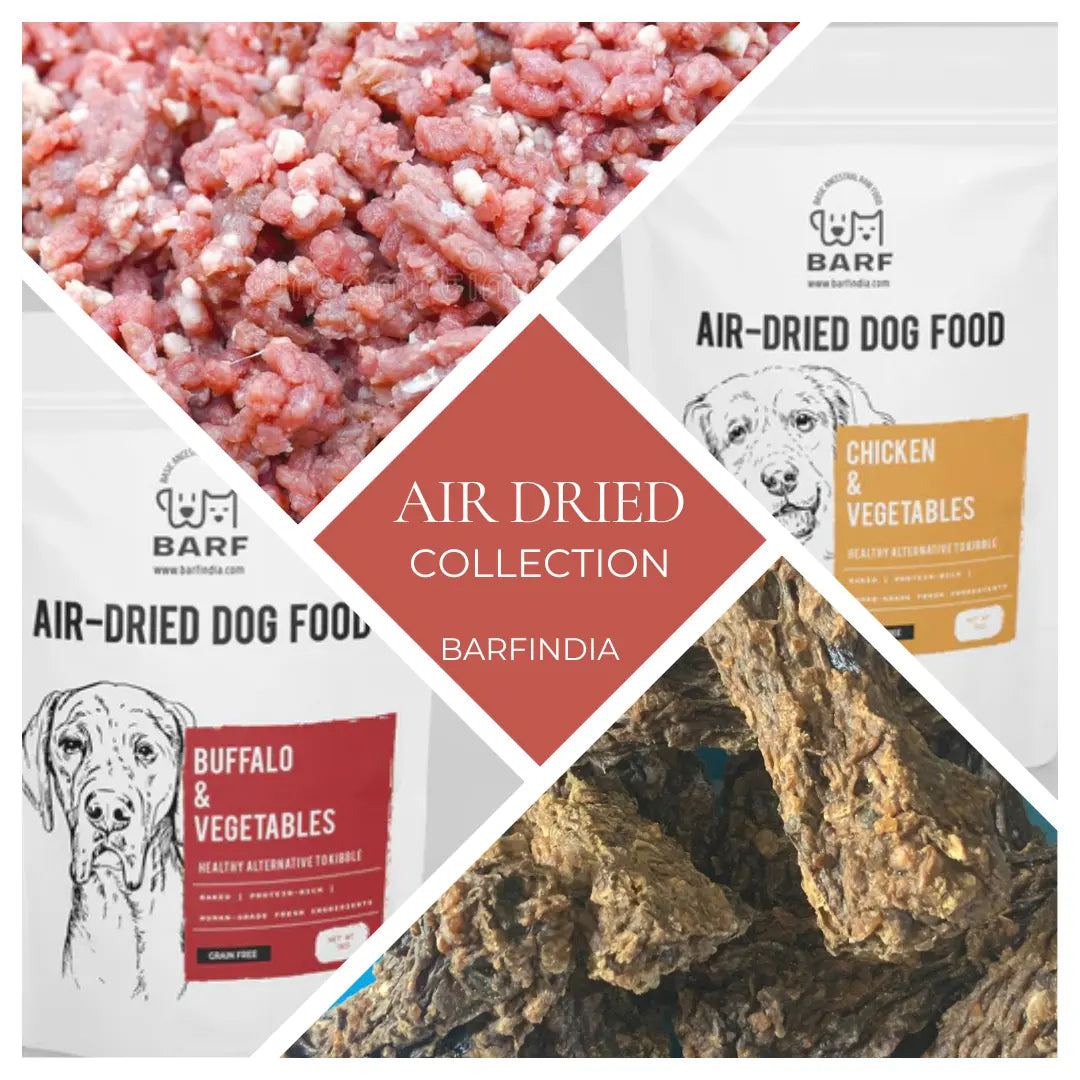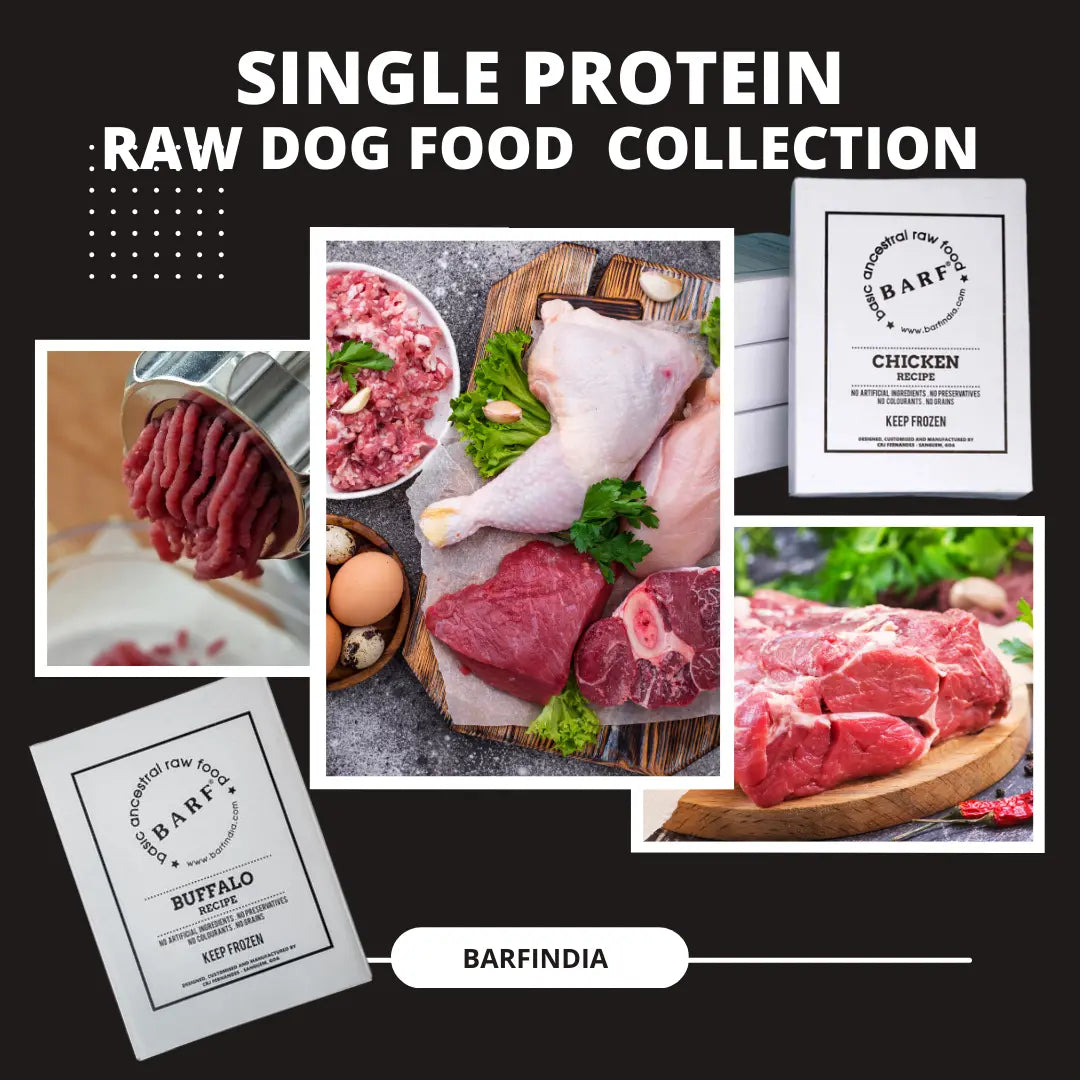
Zinc Deficiency in Dogs
Nivedita FernandesZinc Deficiency and Skin Health in Dogs
Zinc is a vital trace mineral for dogs, essential for various physiological functions such as immune support, skin and coat health, wound healing, and enzyme production. A deficiency in zinc can significantly impact your dog’s skin health and overall well-being. Understanding the symptoms, causes, and prevention of zinc deficiency is critical for maintaining a happy, healthy pet.
The Role of Zinc in Skin Health
-
Skin Integrity and Repair:
-
Zinc aids in the production of keratin and collagen, essential for maintaining healthy skin and a shiny coat.
-
It supports the repair of damaged skin and wound healing.
-
-
Immune Function:
-
Zinc helps regulate immune responses, reducing the risk of skin infections and inflammation.
-
-
Sebum Production:
-
Proper levels of zinc ensure healthy oil (sebum) production, which keeps the skin hydrated and prevents dryness.
-
-
Antioxidant Properties:
-
Zinc protects skin cells from oxidative damage, slowing premature aging and cellular degradation.
-
Signs of Zinc Deficiency in Dogs
-
Skin-Related Symptoms:
-
Zinc-Responsive Dermatosis: Crusty, thickened lesions around the eyes, mouth, ears, elbows, and paws.
-
Dry, Flaky Skin: Resembling dandruff, with patches of irritated, inflamed skin.
-
Hair Loss (Alopecia): Often localized around the face or limbs.
-
Hyperkeratosis: Thickened, crusty skin on the nose or paw pads.
-
-
Other Symptoms:
-
Poor Wound Healing: Delayed recovery from cuts or scrapes.
-
Frequent Infections: Weakened immunity leads to recurring skin infections (pyoderma) or hot spots.
-
Digestive Issues: Chronic diarrhea or vomiting.
-
Stunted Growth (in Puppies): Poor growth and skeletal development in young dogs.
-
-
Behavioral Changes:
-
Anxiety, restlessness, or unusual behaviors like pica (eating non-food items).
-
Breeds Prone to Zinc Deficiency
Certain breeds are genetically predisposed to zinc-responsive dermatosis and related skin conditions:
-
Northern Breeds: Siberian Huskies, Alaskan Malamutes.
-
Large Breeds: Great Danes, German Shepherds.
These breeds may require higher zinc levels due to reduced absorption efficiency.
Causes of Zinc Deficiency in Dogs
-
Dietary Imbalances:
-
Insufficient zinc in the diet or feeding overly processed foods.
-
Excess calcium in the diet, which interferes with zinc absorption.
-
-
Absorption Issues:
-
Some dogs have genetic or medical conditions that impair zinc absorption.
-
-
Poor Quality Ingredients:
-
Diets lacking high-quality, bioavailable zinc sources like organ meats or seafood.
-
How to Treat Zinc Deficiency in Dogs
-
Zinc Supplementation:
-
Zinc Chelates: Highly bioavailable forms like zinc methionine or zinc picolinate.
-
Zinc Sulfate or Gluconate: Common supplements prescribed by veterinarians.
-
-
Dietary Adjustments:
-
Incorporate zinc-rich foods into the diet, such as organ meats (liver), red meats (beef, lamb), seafood (clams, oysters), and egg yolks.
-
Balance calcium-to-phosphorus ratios to avoid mineral interference.
-
-
Address Underlying Conditions:
-
Treat any medical issues causing malabsorption or increased zinc requirements.
-
-
Topical Treatments:
-
Medicated shampoos or creams to soothe inflamed or infected skin.
-
Foods Rich in Zinc
1. Organ Meats
Organ meats are some of the richest natural sources of zinc. Adding them to your dog’s diet can provide a significant boost:
-
Beef Liver: 4.0 mg of zinc per 100 g. Use in moderation as a nutrient-packed addition to your dog’s meals.
-
Pork Liver: 6.0 mg of zinc per 100 g.
-
Lamb Liver: 3.5 mg of zinc per 100 g.
Check out our Zinc-Rich Freeze-Dried Beef Liver Treats for an easy-to-serve option.
2. Red Meat
Red meats are another excellent source of bioavailable zinc:
-
Beef: 4.5 mg of zinc per 100 g.
-
Lamb: 6.0 mg of zinc per 100 g.
-
Venison: 4.0 mg of zinc per 100 g.
Our Premium Grass-Fed Lamb Chunks are perfect for a raw or home-cooked diet.
3. Seafood
Seafood offers a powerhouse of zinc and other trace minerals:
-
Clams: 2.0–3.5 mg of zinc per 100 g.
-
Oysters: A whopping 90 mg of zinc per 100 g!
-
Mussels: 40 mg of zinc per 100 g.
Try our Sustainably Sourced Freeze-Dried Clams to incorporate this nutrient-rich ingredient into your dog’s diet.
4. Egg Yolks
While not as zinc-dense as organ meats or seafood, egg yolks can still contribute:
-
Approximately 0.4 mg of zinc per 100 g.
Combine with other zinc-rich foods for a balanced meal.
How to Safely Include Zinc-Rich Foods
-
Cook Organ Meats and Seafood:
-
Always cook clams, oysters, and other seafood thoroughly to eliminate harmful bacteria.
-
-
Avoid Excessive Calcium:
-
High calcium levels can inhibit zinc absorption, so balance the diet carefully.
-
-
Monitor Quantities:
-
Over-supplementation of zinc can lead to toxicity. Consult with a veterinarian to ensure proper dosing.
-
Clams as a Zinc Source
Clams are a nutrient-dense option for dogs, rich in zinc, iron, and vitamin B12. However, they must be fed responsibly:
-
Cooked Only: Raw clams can harbor harmful bacteria or parasites.
-
Shell-Free: Remove all shells to prevent choking hazards.
-
Moderation: Limit to small portions (e.g., 2-3 clams for medium-sized dogs).
-
Check for Allergies: Introduce clams gradually to monitor for adverse reactions.
For convenience, try our Freeze-Dried Clam Snacks for Dogs.
Preventing Zinc Deficiency in Dogs
-
Feed a Balanced Diet:
-
Include a mix of muscle meat, organ meat, seafood, and egg yolks.
-
Ensure the diet meets or exceeds AAFCO guidelines for zinc levels.
-
-
Monitor High-Risk Breeds:
-
Breeds prone to zinc-responsive dermatosis may need additional supplementation.
-
-
Regular Vet Checkups:
-
Have a veterinarian evaluate your dog’s nutritional status, especially if you notice signs of zinc deficiency.
-
Conclusion
Zinc deficiency can severely impact a dog’s skin health, leading to conditions like dry, flaky skin, hair loss, and zinc-responsive dermatosis. By providing a balanced diet with zinc-rich ingredients and monitoring for signs of deficiency, you can ensure your dog’s skin and coat remain healthy and vibrant.
Explore our Zinc-Enriched Product Range to ensure your furry friend gets the nutrients they need. Always consult with a veterinarian before making dietary changes or introducing supplements to your pet’s routine.



